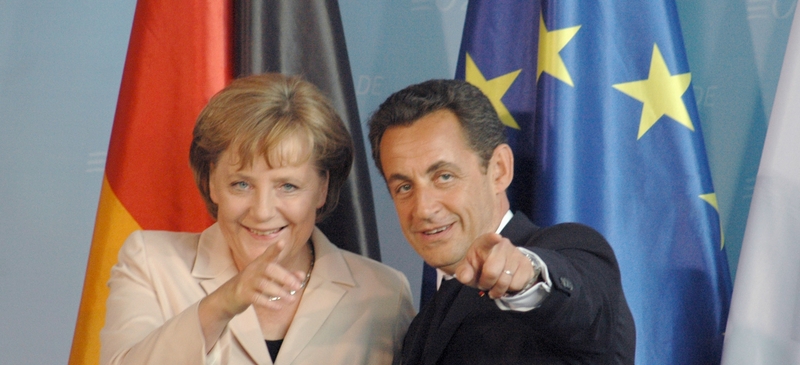A recent round of conversations with officials in the Elysée Palace and the finance and foreign ministries made clear that Hollande knows well that a strong Franco-German relationship is indispensable to sorting out the problems of the euro zone in particular and the EU in general. But Hollande wants a more balanced relationship.
They emphasize that the "Deauville model" of Paris-Berlin relations — in which Chancellor Angela Merkel persuaded Sarkozy to accept a policy and the two would then impose it on reluctant fellow leaders — has been scrapped.
Instead, the new president has sought to strengthen France's position in a number of ways. One has been to consult other countries — especially Italy and Spain — and the European Commission on key issues. Sarkozy avoided getting too close to Southern Europe, lest the financial markets associate France with their problems. Hollande does not have that hang-up. At his first summit, he lined up with Italy's Mario Monti and Spain's Mariano Rajoy. The Germans were not amused, but — according to the French — they have now seen that a more inclusive system of leadership is in their interest. And Hollande's officials claim that he is not so crude as to try to put together a bloc to counter Germany.
Hollande's second way of strengthening French influence has been to retain the austere fiscal targets that he inherited, notably by limiting the budget deficit to 3 percent of GDP in 2013. Government officials said that while the current emphasis is on shrinking the deficit through tax increases, in future years spending cuts will predominate.
Thirdly, France intends to improve its competitiveness. Outside France, Hollande and his ministers are not perceived as being particularly committed to structural economic reform. But the officials in Paris said the government was determined to reform labor markets. And if the result is street protests? He will stand firm, they insist.
After a rocky start with Merkel, Hollande's advisers say he now has a good working relationship with her. The mercurial Sarkozy and the cautious chancellor were not natural soul mates. Hollande tends to be a consensus builder and soft-spoken — like Merkel.
French officials claim that Hollande helped persuade Germany's leaders to shift some of their thinking on the euro crisis. For example, Merkel and Wolfgang Schäuble, her finance minister, have rallied behind Mario Draghi, president of the European Central Bank, in his scheme to intervene in bond markets to lower the borrowing costs of peripheral countries. The German government has also made clear that — like France — it wants Greece to stay in the euro, for fear of the consequences of its departure.
But tensions remain. The French support the European Commission's proposals for an EU-wide system of bank supervision that would cover all Europe's banks; the Germans want only the largest, cross-border banks to be covered. Furthermore, the German government is counseling Spain not to activate the Draghi mechanism to intervene in bond markets; the French believe that the mechanism must be used soon, lest the financial markets cease to believe in its potency.
There is also a huge distance between Paris and Berlin on longer-term issues of euro zone governance. The French worry about the incoherence of the way the euro zone is managed. They want the Eurogroup (the regular meetings of euro zone finance ministers) to provide some of the missing leadership by appointing a full-time president and introducing majority voting. Germans worry that a stronger Eurogroup could erode the independence of the European Central Bank.
The French think that because they have swallowed the painful medicine of the fiscal compact and thus given away some of their cherished budgetary sovereignty, Germany should be keener to discuss euro bonds (the mutualization of European debt), pan-European bank deposit insurance and a bank resolution regime. Germany still says no to those ideas, since they would cost it money.
Another broad disagreement is over the woolly concept of political union, which is moving up the EU's agenda. Guido Westerwelle, the German foreign minister, with several other foreign ministries, recently published a report on Europe's future that proposed classic federalist solutions to the EU's problems: majority voting on foreign policy, a stronger role for the high representative for foreign policy, a European army, an elected Commission president, a stronger European Parliament and a new system for ratifying treaties (to prevent small countries from holding back everybody else).
In Paris there is no enthusiasm for political union, partly because it would require the negotiation of a major new treaty, with all the attendant difficulties. Although France was involved in the Westerwelle group — sending a junior minister, rather than the foreign minister — some French officials talk disdainfully of it. "When the EU is in crisis, the Germans have a Pavlovian reaction and call for political union, without really meaning it," said one. The EU's priority, the French believe, should be fixing the euro: The 17 that use it should agree on whatever arrangements are necessary and then allow others to sign up.
Despite their wariness of political union, French officials do recognize the need for greater democracy and accountability at euro zone level. The people around Hollande and Finance Minister Pierre Moscovici criticize the European Commission and the European Parliament less viciously than Sarkozy's people did; they accept, albeit reluctantly, that the Commission must play a role in supervising the economic and budgetary policies of euro zone states. In general, Hollande's relatively communautaire approach puts him closer to traditional German thinking than to Gaullist thinking.
So far, Hollande's new approach to Germany — working closely with it, but not following slavishly — seems to have been moderately successful. But if he wants France's influence in the European Union to approach Germany's in the long run, he will have to deliver on his promise to boost the competitiveness of the French economy.

